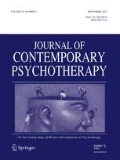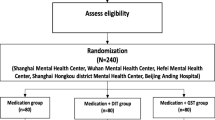Abstract
Treatment studies and particularly psychotherapeutic treatment studies of patients suffering from an adjustment disorder are very scarce, leading to insufficient evidence regarding the efficacy of treatment in this population. Whereas timely psychotherapy is known to be of benefit in the treatment of adjustment disorders, the ideal duration of psychotherapeutic interventions is not known. This study examined whether a brief 12-session focused psychodynamic psychotherapy may be as efficient as a longer intermediate-term (1 year) psychodynamic psychotherapy in treating patients suffering from an adjustment disorder. Subjects (n = 66) were randomly assigned to either brief or intermediate psychotherapy. They were assessed by self-report measures and clinician’s evaluation at baseline, end of therapy, and 9 months after therapy was terminated. The results showed a good overall improvement in the whole group. Furthermore, brief psychotherapy was found to be as good as intermediate psychotherapy both at the end of treatment and at follow-up. Although our study was not designed to confirm the efficacy of dynamic psychotherapy in the treatment of adjustment disorders, our results suggest that brief interventions may be good enough in adjustment disorder, thus allowing treatment of a greater number of patients without compromising for the quality and suitability of treatment.

Similar content being viewed by others
References
Altenhofer, A., Schulz, W., Schwab, R., et al. (2007). Psychotherapy of adjustment disorders. Is psychotherapy if limited to 12 sessions sufficiently effective? Psychotherapeutics, 52, 24–34.
Azocar, F., & Greenwood, G. L. (2007). Adult adjustment disorder: A review of its current diagnostic status: A Brief Report. The Internet Journal of Mental Health, 4, 3.
Barron, F. (1953). An ego strength scale which predicts response to psychotherapy. Journal of Consulting Psychology, 17(5), 327–333.
Barrowclough, C., Meier, P., Beardmore, R., & Emsley, R. (2010). Predicting therapeutic alliance in clients with psychosis and substance misuse. Journal of Nervous and Mental Disease, 198(5), 373–377.
Baumeister, H., & Kufner, K. (2009). It is time to adjust the adjustment disorder category. Current Opinion in Psychiatry, 22(4), 409–412.
Baumeister, H., Maercker, A., & Casey, P. (2009). Adjustment disorders with depressed mood: A critique of its DSM-IV and ICD-10 conceptualization and recommendations for the future. Psychopathology, 42(3), 139–147.
Bhar, S. S., Thombs, B. D., Pignotti, M., Bassel, M., Jewett, L., Coyne, J. C., et al. (2010). Is longer-term psychodynamic psychotherapy more effective then shorter-term therapies? Review and critique of the evidence. Psychotherapy and Psychosomatics, 79(4), 208–216.
Cabaniss, B. L., Cherry, S., Douglas, C. J., & Schwartz, A. R. (2011). Psychodynamic psychotherapy: A clinical manual. West Sussex: Wiley.
Carta, M. G., Balestrier, M., Murru, A., & Hardoy, M. C. (2009). Adjustment disorder: Epidemiology, diagnosis and treatment. Clinical Practice and Epidemiology in Mental Health,. doi:10.1186/1745-0179-5-15.
Casey, P. (2001). Adult adjustment disorder: A review of its current diagnostic status. Journal of Psychiatric Practice, 7(1), 32–40.
Casey, P. (2009). Adjustment disorder: Epidemiology diagnosis and treatment. CNS Drugs, 23(11), 927–938.
Cohen, J. (1977). Statistical power analysis for the behavioral sciences. New York: Academic Press.
Derogatis, L. R. (1983). SCL-90-R: Administration, scoring, and procedures manual-II. In M. D. Towson (Ed.), Clinical Psychometric Research. Baltimore: John Hopkins University Press.
First, M. B., Spitzer, R. L., Gibbon, M. & Williams, J. B.W. (1995). Structured clinical interview for DSM-IV patient edition (SCID-I/P, Version 2.0). Biometrics Research Department. New York: New York State Psychiatric Institute.
Gorschenek, N., Schwab, R., & Eckert, J. (2008). Psychotherapy of adjustment disorders. Psychotherapy, Psychosomatic and Medical Psychology, 58(5), 200–207.
Guy, W. (1976). Clinical Global Impressions. In ECDEU assessment manual for psychopharmacology, revised. Rockville: MD: National Institute of Mental Health National Institute of Mental Health, pp. 217–22.
Horvath, A. O., & Greenberg, L. S. (1989). Development and validation of the Working Alliance Inventory. Journal of Consulting and Clinical Psychology, 36(2), 223–233.
Knekt, P., Lindfors, O., Harkanen, T., Valikoski, M., Virtala, E., Laaksonen, M. A., et al. (2008a). Randomized trial on the effectiveness of long- and short-term psychodynamic psychotherapy and solution-focused therapy on psychiatric symptoms during a 3-year follow-up. Psychological Medicine, 38(5), 689–703.
Knekt, P., Linfors, O., Laaksonen, M. A., Raitasalo, R., Haaramo, P., & Jarvikoski, A. (2008b). Effectiveness of short-term and long-term psychotherapy on work ability and functional capacity—A randomized clinical trial on depressive and anxiety disorders. Journal of Affective Disorders, 107(1–3), 95–106.
Laugharne, J., van der Watt, G., & Janca, A. (2009). It is too early for adjusting the adjustment disorder category. Current Opinion in Psychiatry, 22(1), 50–55.
Leichsenring, F., & Leibing, E. (2007). Psychodynamic psychotherapy: A systematic review of techniques, indications and empirical evidence. Psychology and Psychotherapy, 80(2), 217–228.
Leichsenring, F., Rabung, S., & Leibing, E. (2004). The efficacy of short-term psychodynamic psychotherapy in specific psychiatric disorders: A meta-analysis. Archives of General Psychiatry, 61(12), 1208–1216.
Maercker, A., Forstmeier, S., Enzler, A., Krusi, G., Horler, E., Maier, C. & Ehlert, U. (2008). Adjustment disorders, posttraumatic stress disorder, and depressive disorders in old age: findings from a community survey. Comprehensive Psychiatry, 49(2), 113–120.
Maina, G., Forner, F., & Bogetto, F. (2005). Randomized controlled trial comparing brief dynamic and supportive therapy with waiting list condition in minor depressive disorders. Psychotherapy and Psychosomatics, 74(1), 43–50.
Malan, D. H. (1976). Toward a validation of dynamic psychotherapy: A replication. New York: Plenum.
Ogrodniczuk, J. S., Joyce, A. S., & Piper, W. E. (2005). Strategies for reducing patient-initiated premature termination of psychotherapy. Harvard Review of Psychiatry, 13, 57–70.
Shalev, A. Y., Abramowitz, M. Z. & Kaplan-De-Nour, A. (1994). Structured clinical interview for DSM-IV patient edition (SCID-I/P, Version 2.0; Hebrew Version, 1994). Center for Traumatic Stress, Department of Psychiatry. Jerusalem: Hadassah University Hospital.
Shedler, J. (2010). The efficacy of psychodynamic psychotherapy. American Psychologist, 65(2), 98–109.
Startup, M., Jackson, M. C., & Bendix, S. (2002). The concurrent validity of the Global Assessment of Functioning (GAF). British Journal of Clinical Psychology, 41(4), 417–422.
Stirman, S. W., DeRubeis, R. J., Crits-Christoph, P., & Rothman, A. (2005). Can the randomized controlled trial literature generalize to nonrandomized patients? Journal of Consulting and Clinical Psychology, 73(1), 127–135.
Strain, J., & Diefenbacher, A. (2008). The adjustment disorders: The conundrums of the diagnoses. Comprehensive Psychiatry, 49(2), 121–130.
Veit, C. T., & Ware, J. E. (1983). The structure of psychological distress and well-being in general populations. Journal of Consulting and Clinical Psychology, 51(5), 730–742.
Acknowledgments
We thank Dr. Yaron Yagil and Mrs. Yael Gottlieb-Litvin for their active role in designing and conducting this study. The study was funded by internal means only.
Conflict of interest
The authors declare that they have no conflict of interest.
Author information
Authors and Affiliations
Corresponding author
Rights and permissions
About this article
Cite this article
Ben-Itzhak, S., Bluvstein, I., Schreiber, S. et al. The Effectiveness of Brief Versus Intermediate Duration Psychodynamic Psychotherapy in the Treatment of Adjustment Disorder. J Contemp Psychother 42, 249–256 (2012). https://doi.org/10.1007/s10879-012-9208-6
Published:
Issue Date:
DOI: https://doi.org/10.1007/s10879-012-9208-6




